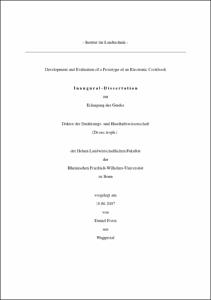Pozzi, Daniel: Development and Evaluation of a Prototype of an Electronic Cookbook. - Bonn, 2007. - Dissertation, Rheinische Friedrich-Wilhelms-Universität Bonn.
Online-Ausgabe in bonndoc: https://nbn-resolving.org/urn:nbn:de:hbz:5N-10906
Online-Ausgabe in bonndoc: https://nbn-resolving.org/urn:nbn:de:hbz:5N-10906
@phdthesis{handle:20.500.11811/2716,
urn: https://nbn-resolving.org/urn:nbn:de:hbz:5N-10906,
author = {{Daniel Pozzi}},
title = {Development and Evaluation of a Prototype of an Electronic Cookbook},
school = {Rheinische Friedrich-Wilhelms-Universität Bonn},
year = 2007,
note = {This work is an explorative study on the development and evaluation of a prototype of an electronic cookbook for food preparation. The methods correspond to a large extend to the User Centered Design approach, i.e. first guidelines for product development are derived from a consumer study which reassumes and extends findings from literature. Then, the prototype delivered by the project partner is tested to determine in how far the cooking behaviour is influenced by such a system.
On the basis of contemporary research it is deduced that food preparation divides into at least two situations: everyday cooking and cooking for special occasions. In common situations meals are normally prepared within 30 minutes without recipe and under several limitations, as the lack to respect a well-balanced nutrition. In contrast, elaborate meals for special occasions are prepared infrequently and make high demands on knowledge, time and preparation techniques. Durations of two hours of preparation time and the use of recipes are the rule. New recipes are tried out which require unknown ingredients and techniques.
The prototype used for the experiments offers functions for quick switching between recipes, easy conversion of ingredient amounts and easy creation of shopping lists to support both everyday and special occasion cooking. By means of two recipes prepared by test persons under observation and under realistic conditions the prototype was tested against a conventional cookbook. In doing so, a method to assess cooking behaviour quantitatively is implemented for the first time.
The results of the cooking experiments do not reveal an influence of the electronic cookbook, which is also underlined by the subjective rating of the participants. Solely the combination of first participation, the unused prototype and the more complex recipe leads to a slight overload of working capacity at times, which does not affect the general behaviour, though.
A characteristic of the quantitative data is the high variability, which would mask possible weaker influences of the electronic cookbook. Strong differences are observable between the participants, which mainly affects the total preparation time. To a high extend these difference can be explained by the individually differently pronounced skills which required to prepare the recipe.
It can be assessed as good that the prototype has no measurable influence on cooking behaviour, although the adequacy of resources can be put into question. However, if the used prototype is seen as a basis for future work, the efforts can be justified. Especially the briefly outlined advanced recipe structure in combination with an electronic cookbook could transfer purposeful information to reduce sources of errors. Furthermore, a connection to the appliances with a proper display of the processes and expert advice could aid to prepare ingredients optimally and thereby ensure a high meal quality.},
url = {https://hdl.handle.net/20.500.11811/2716}
}
urn: https://nbn-resolving.org/urn:nbn:de:hbz:5N-10906,
author = {{Daniel Pozzi}},
title = {Development and Evaluation of a Prototype of an Electronic Cookbook},
school = {Rheinische Friedrich-Wilhelms-Universität Bonn},
year = 2007,
note = {This work is an explorative study on the development and evaluation of a prototype of an electronic cookbook for food preparation. The methods correspond to a large extend to the User Centered Design approach, i.e. first guidelines for product development are derived from a consumer study which reassumes and extends findings from literature. Then, the prototype delivered by the project partner is tested to determine in how far the cooking behaviour is influenced by such a system.
On the basis of contemporary research it is deduced that food preparation divides into at least two situations: everyday cooking and cooking for special occasions. In common situations meals are normally prepared within 30 minutes without recipe and under several limitations, as the lack to respect a well-balanced nutrition. In contrast, elaborate meals for special occasions are prepared infrequently and make high demands on knowledge, time and preparation techniques. Durations of two hours of preparation time and the use of recipes are the rule. New recipes are tried out which require unknown ingredients and techniques.
The prototype used for the experiments offers functions for quick switching between recipes, easy conversion of ingredient amounts and easy creation of shopping lists to support both everyday and special occasion cooking. By means of two recipes prepared by test persons under observation and under realistic conditions the prototype was tested against a conventional cookbook. In doing so, a method to assess cooking behaviour quantitatively is implemented for the first time.
The results of the cooking experiments do not reveal an influence of the electronic cookbook, which is also underlined by the subjective rating of the participants. Solely the combination of first participation, the unused prototype and the more complex recipe leads to a slight overload of working capacity at times, which does not affect the general behaviour, though.
A characteristic of the quantitative data is the high variability, which would mask possible weaker influences of the electronic cookbook. Strong differences are observable between the participants, which mainly affects the total preparation time. To a high extend these difference can be explained by the individually differently pronounced skills which required to prepare the recipe.
It can be assessed as good that the prototype has no measurable influence on cooking behaviour, although the adequacy of resources can be put into question. However, if the used prototype is seen as a basis for future work, the efforts can be justified. Especially the briefly outlined advanced recipe structure in combination with an electronic cookbook could transfer purposeful information to reduce sources of errors. Furthermore, a connection to the appliances with a proper display of the processes and expert advice could aid to prepare ingredients optimally and thereby ensure a high meal quality.},
url = {https://hdl.handle.net/20.500.11811/2716}
}






